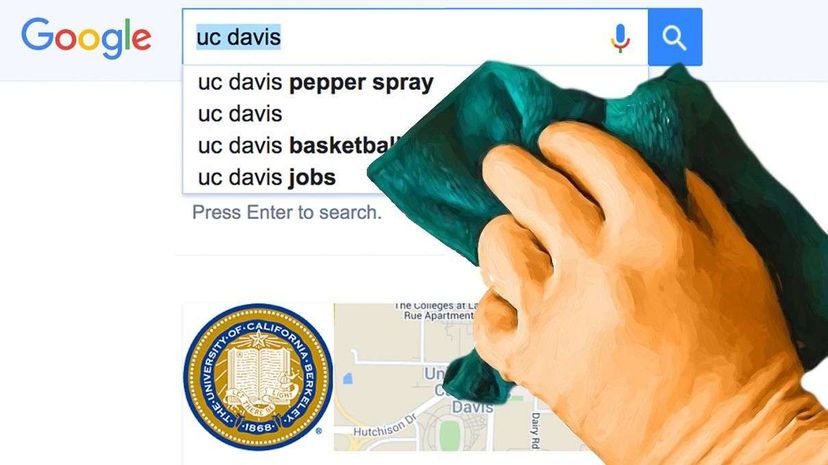
For the University of California, Davis, the public relations nightmare starts in Google.
When a prospective student types "UC Davis" into the Google toolbar, the autocomplete function instantly suggests "UC Davis pepper spray." Huh, what's that all about? One click later, this impressionable high schooler — who might have applied to the UC Davis, spent tens of thousands of dollars on tuition, and donated generously as an alumnus — is watching a disturbing YouTube video of campus police pepper-spraying the faces of a dozen peaceful student protesters in 2011.
Advertisement
Cancel that application.
It's been almost five years since the UC Davis pepper spray video first went viral, but the university's PR fiasco continues. Last week, the Sacramento Bee revealed that UC Davis spent at least $175,000 in an attempt to "scrub the Internet" of the shameful 2011 event. Student protesters are now calling for the resignation of Chancellor Linda Katehi, accusing her of diverting educational funds to pay exorbitant fees for what amounts to an online "cover-up."
All of this made us wonder, can you really scrub the Internet of bad press? In this age of amateur cellphone videos and endless social media commentary, can an institution pay to whitewash their brand online?
"'Scrubbing' is a bit of a misnomer," says Brian Patterson, partner and co-founder of Go Fish Digital, a digital marketing agency that specializes in online reputation management, known as ORM in PR lingo. "Rarely can you erase something from the Internet, and especially not a case like UC Davis, where it's coverage of an event that actually happened. There was no scrubbing to be done there."
Andy Beal, CEO of Reputation Refinery and author of "Repped: 30 Days to a Better Online Reputation," agrees, noting that you can only pull content from a website or search results if you successfully sue in court for libel.
"You cannot simply remove negative items from Google's index unless you can get a court order," writes Beal in an email. "In those cases, Google will honor a request for removal."
But the legal standards for libel — which is defined as "written defamation" — are high. In 2013, a Virginia contractor sued a former client for libel when the disgruntled woman wrote a damaging online review accusing him of shoddy workmanship and even theft. A judge first ordered the woman to rewrite the review, but the Virginia Supreme Court reversed the decision, citing her constitutional right to free speech.
Instead of petitioning websites to remove damaging content — which they almost never do, says Patterson — or taking a bad review to court, the main technique of online reputation management is simple: accentuate the positive.
"Let's say we have a client who has a 30-year history of being really involved with the community through a charitable foundation. They have one unfortunate incident, and now when you Google their brand name, that one negative thing defines them," says Patterson. "Our work is about highlighting the many good things that the company has done and using SEO techniques to push that positive content to the top of the search results."
There's no magic trick to placing good reviews and positive news stories in search engines. In the early days, marketers could game the system by buying dozens of junk domain names (ACMEisgreat.com) and stuffing them with glowing keywords. But Patterson says those "spammy SEO techniques" stopped working years ago as Google and other search engines upgraded their algorithms.
Today, online reputation management is much more about amplifying the positive attributes of a brand through a variety of online media. A company might build a microsite to highlight sustainability efforts, use Twitter and Facebook to publish positive news stories and respond quickly to criticism, and closely monitor Wikipedia for misinformation.
For its part, UC Davis and its embattled chancellor are trying to be more transparent. In an April 18 statement, a repentant Chancellor Katehi took ownership for the mistakes made in 2011 but defended the decision to beef up the UC Davis strategic communications budget to emphasize the university's many accomplishments. UC Davis students are still calling for her head.
"UC Davis has to first convince its detractors that it has changed its policies and no longer deserves the negative reputation," writes online reputation expert Beal. "If you simply try to sweep things under the cyber rug, then your attackers will cry foul. Focus on improving your character, and your reputation will improve, too."
Advertisement
